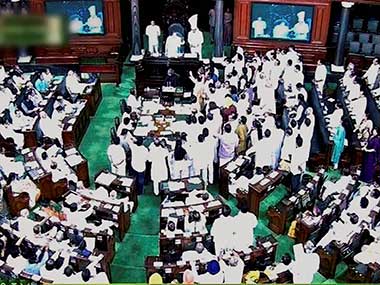Soon after Narendra Modi was sworn in, he issued a diktat of an 18-hour workday. When his ministers were asked how they would cope with that direction, they could only smile sheepishly. Plainly put, they weren’t given the option to refuse. Now, it seems like Modi’s work ethic has also stung the Lok Sabha into action. The parliament and parliamentarians are working overtime and making useful interventions on issues of public importance in legislative business. The data compiled by the PRS Legislative Research shows that the Lok Sabha worked for 123% of its scheduled time, while Rajya Sabha’s productivity was at 101%, which makes it most productive session in the last 15 years. [caption id=“attachment_2238784” align=“alignleft” width=“380”]  PTI[/caption] During the Budget session, the Lok Sabha lost 6 hours and 54 minutes due to disruptions but made up for the lost time by giving up lunch hours and working beyond the scheduled close for 42 hours and 41 minutes. The Rajya Sabha lost 18 hours and 28 minutes but gained 20 additional hours of sittings. In the last one year – since the BJP-led NDA assumed office – the Lok Sabha held 90 sittings while the Rajya Sabha had 87, the highest in the last ten years. It also saw passage of 47 bills. The BJP leadership may be gloating in achieving a record performance by Parliament, but it was not without it’s fair share of embarrassments and poor floor management. The opposition tactically used prescribed norms to corner the government, at least twice in Rajya Sabha where the ruling NDA is in a minority. In one of the rare moves, an amendment to the Motion of Thanks for the President’s Address was passed in Rajya Sabha. The motion expressed regret that the government has not taken any steps to curb corruption and black money. That was one of the embarrassing moments for the Modi government but then it succeeded in passing a new bill to curb the black money menace on last working day of this session. This session also has the distinction of passing Private Member Bill moved by Tiruchi Siva, `Rights of Transgender Persons Bill’ in the Rajya Sabha. No Private Member Bill has been passed by either House in the last 47 years. The government, however, is taking that in their stride. Parliamentary Affairs Minister Venkaiah Naidu found the conclusion of the budget session to be an appropriate occasion to boast of his performance: “The Government is going to complete one year in office soon. I am happy to report that during the last one year, there has been a perceptible improvement in the functioning of the Parliament marking a beginning towards restoration of people’s respect for and confidence in democratic institutions. This is a significant achievement for all the concerned.” He added that this turnaround was made possible by the sincere efforts of the Government to reach out to the opposition and other parties from time to time on various issues and accommodating their concerns even by going out of way on several occasions and by the force of the legislative proposals of the Government. On the two most critical bills listed in the second half of this session, land acquisition and GST, the government ultimately had to bow to opposition’s pressures. The land acquisition bill was sent to the joint committee of both houses of parliament for further scrutiny and GST, a constitutional amendment bill to a Select Committee of the Rajya Sabha. In this session a total of 24 bills were passed including the ordinances on insurance, coal mines, mines and minerals, citizenship, Andhra Pradesh reorganisation, which were replaced by the bill. The Land Acquisition Bill (Ordinance promulgated twice) was referred to a Joint Parliamentary Committee. The PRS made an interesting factual observation on re-promulgation of land ordinance – after 28 years, an ordinance was promulgated after proroguing a House while Parliament was in session. There have been only six such instances in the past. The data compiled by the research group indicated that in the Rajya Sabha, 31 percent of scheduled questions were answered orally. This is the highest percentage of questions answered orally in the past 10 years. During this session, about 135 questions were answered orally in Lok Sabha and Rajya Sabha respectively. Typically, in the last 10 years, the average has been 64 questions in Lok Sabha and about 70 in Rajya Sabha. This session also saw the highest instances of recorded voting in the past 15 years. So far, in the 16th Lok Sabha, 17 percent of the Bills have been passed by recorded voting. On average, in the past 15 years, each Lok Sabha saw about five percent of the Bills being passed by recorded voting, PRS stated.
Soon after Narendra Modi was sworn in, he issued a diktat of an 18-hour workday. When his ministers were asked how they would cope with that direction, they could only smile sheepishly. Plainly put, they weren’t given the option to refuse.
Advertisement
End of Article


)
)
)
)
)
)
)
)
)



